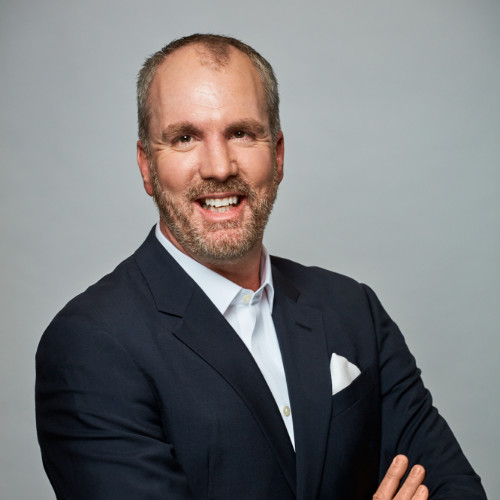Or listen in your favorite podcast app
Apple Podcasts / Google Podcasts / Spotify
There are countless ways that humans and technology interact. And those interactions are becoming more and more prevalent in every aspect of daily life. But not everyone likes to use technology in the same way. So when you’re dealing with every single type of person imaginable, like Scott Strickland does as the EVP & Chief Information Officer at Wyndham Hotels & Resorts, you have to really understand and offer every kind of digital experience. It’s a massive job, which takes creativity, coordination, and skill. On this episode of IT visionaries, Scott explains how he manages the job, the role new technologies like A.I. and RPA play in the process, and the other challenges he faces as a CIO.
Best Advice: “Leverage your network. Don’t be afraid to ask other CIOs for help.”
Key Takeaways
- The IT experience is much more front-and-center than ever before in all parts of the business operations and customer journey
- The hospitality industry has been disrupted in good ways, but there are still areas where technology is lacking or not up to par
- After you digitally transform, you evolve and must keep evolving
Scott’s Current role at Wyndham
This is Scott’s third CIO role and his largest in terms of total scope. His first time in the CIO chair was at Black & Decker HHI, and Scott said it was the classic job dealing with IT. But his second time around he saw the role begin to expand and include more and more elements. In his current role, it’s everything from the past and much more, including serving three different kinds of customers: the franchisee, guest interaction, internal team members. Wyndham has 9,000 franchises worldwide, so Scott has to be mindful of each of their systems and needs. He also has to serve the needs of the customers who are looking to technology to aid them in the hotel experience. Making sure they have the different digital products they need falls under Scott’s umbrella. As IT is front and center in all parts of a business these days, Scott is constantly working to build the best experiences possible for every type of person he serves.
“The IT experience is so front and center. It's part of that customer experience. Whereas, back in the day, it wasn't critical. When we were first building and putting out a website, a website was seen as brand or marketing. It wasn't e-commerce for a little while and then you learned, whoa, this can actually have a big impact on my bottom line. If I can shave two clicks off of this, my conversion rate on my e-com website goes up by five points and that's worth $8 million, or whatever your equation would be. So IT became more and more important to focus on that customer experience.”
Looking at the digital infrastructure across all Wyndham properties
Wyndham has 20 different brands from economy to ultra-luxury. Going across the entire spectrum of brands and serving them with the same set of IT is the key. There is one set of digital structures but the way it looks changes based on who the customer is using the infrastructure.
“The key for us was really establishing a common set of platforms and then innovating and differentiating by brand on top of it….That lets us not focus on the interfaces, but instead focus on some innovation and focus on some more unique guest experiences.”
The balance between human-to-human and human-to-tech experiences
Different guests want to have different experiences and Scott says that the goal is to have different platforms and experiences for all those guests. Someone who wants a mobile key isn’t the same as someone who prefers to be greeted by name and have a face-to-face experience. The key is being able to offer those types of experiences to the guest and have each different type be exceptional at every stage.
Disruption in the hospitality industry
Mobile has been disruptive in the right ways, Scott says. The fact that you can research and book a place to stay from your car on your way to that destination is a marvel. On the other hand, there is still room to improve the technology used throughout the industry. For example, Scott believes that kiosks are an area that could be better utilized. Scott also says there are certain hoops people don’t want to jump through when they try to log onto the internet at a hotel. For some people, the internet is more important than hot water, so sufficient internet access is one of the biggest values you can give a customer. And it is critical to think about those necessary value-adds because people will check out of your hotel if you do not meet their needs. To address those concerns, Scott was excited about a new initiative Wyndham introduced: Wyndham wifi and Wyndham connectivity services utilizing the scale of Wyndham to provide top-tier access to customers so that it’s never a pain point for them. For a monthly fee, all Wyndham franchises can have best-in-class internet service. The cloud also allows for better access and customer service no matter where in the world you are.
“What I think is great disruption has been the use of mobile devices. The fact that somebody could possibly be sitting in a parking lot outside your hotel, make a reservation, and then walk into your lobby and have that reservation reflected at your front desk system - it's pretty cool from a technology standpoint, but it's even better from a guest experience standpoint.”
“We've done some surveys and determined that for certain demographics — millennials and the like — internet is more important than hot water. They would literally rather go without hot water and having the ability to take a hot shower then not have high-speed internet.”
Where personalization comes into play
Scott says that there is an opportunity to perform mass personalization in the hotel world. Once you can identify a guest and his or her likes and dislikes, you can provide personalized offers to that person, which is an obvious value-add. But people don’t want to be sold to or spammed 24/7, so you have to strike a balance. Scott says that when you’re offering very specific opportunities and access to services like meal delivery or restaurant recommendations, you can make it less like spam to your inbox and more like a service that’s being provided for you.
“If we can identify an archetype and then offer some sort of personalized offer for them so that they can quickly do what they need to do and move on, that's a value-add. That's not a baloney offer that feels like spam coming to your mobile device.”
Where A.I. fits into the hospitality industry
Scott says Wyndham is in the pilot stages of working with A.I. To get the most value out of A.I., you need consistent, repeatable data sets. Once you have those, then you can run predictive analytics on them to create more value and insights. But getting to that level is the most difficult part.
On a different note, Robotic Process Automation (RPA) has been a big success for Wyndham. Scott says they are using RPA in two areas. First, to take mundane tasks off the plate of employees. In fact, the use of RPA has cut task times in half in certain areas. Secondly, RPA is used in the front desk systems to look at what the front desk agent is doing. There is a lot of turnover in that job role, so there isn’t always as much experience. If someone is struggling, a robot prompt will pop up to help them with a task like authorizing a credit card. Scott says that they also use A.I. in security to identify threats and attacks and stop them in their tracks.
“Human plus artificial intelligence is greater than the sum of its parts.”
Wyndham’s digital transformation
The term digital transformation is overused, Scott says. He believes that after you transform, you evolve. Wyndham is in the evolution phase. There are eight standardized platforms they’ve moved to and now must evolve on those to develop new and better functionality. Scott believes that Wyndham shouldn’t be in the software production business, rather they should be optimizing the systems they have. There are two exceptions, though, their app, and their data, which they believe are differentiators for them.
Transforming isn’t easy though, and when it comes to the change management aspect, there were a few hiccups. When you migrate to the cloud, there are roles and responsibilities shift and the way an IT organization is structured is no longer relevant. That was something they had to navigate through.
“People always talk about migrating to SaaS applications or migrating to the cloud. But when you actually do it, then suddenly the way that a typical IT organization it has been structured isn't as relevant. You need to restructure your IT organization.”
Mentions:





